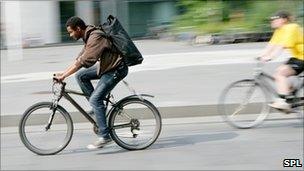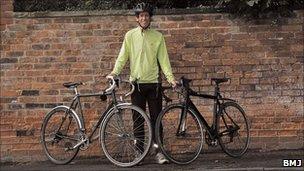It's not about the bike
- Published

More people than ever are cycling to work
It's a no-brainer. Cycling is good for you. It keeps you fit, gets you out in the fresh air and is kind to the environment.
Cycling to work is more popular than ever, because it's an easy way of fitting exercise into the daily routine and it doubles as transport.
According to the government, "regular exercise like cycling halves your chances of suffering from heart disease, and helps to prevent strokes, diabetes, and some kinds of cancer.
"Your blood pressure and resting heart rate will be lower, and you'll feel more awake and less stressed."
And it can save a fortune. Or can it?
Dr Jeremy Groves, a consultant anaesthetist at Chesterfield Royal Hospital and self-confessed cycling fan, discovered that, "spending a lot of money on a bicycle for commuting is not necessarily going to get you to work more quickly".
Dr Groves' set up a trial to test whether his new, lightweight carbon-framed bicycle (which cost £1000) was any faster than his second-hand steel-framed bike bought for £50.
Heavy or light?
For six months he tossed a coin each morning to decide which bike to use - and then timed the journey.

Dr Groves compared his commuting times on a heavy and a light bicycle
His study, published in the British Medical Journal, external, found that there was no measurable difference in commuting time over the 27 miles from Sheffield to his place of work and back.
The average journey time using his heavy, old bike was 1 hour 47 minutes and the average journey for the new, lighter new bike was 1 hour 48 minutes.
"A reduction in the weight of the cyclist rather than that of the bicycle may deliver great benefit at reduced cost," the study says.
Dr Groves declares himself "disappointed" to find out that his financial investment was giving him no extra time in bed and no less time on the road.
"I could have invested that money in better cycle clothing and in tarting up the lights on my bike instead," he said.
Tax break
His findings are also disappointing for those who have used the government's Cycle to Work scheme to buy the bike of their dreams at a discounted price, thanks to tax exemption.
Why invest in a Chris Boardman streamlined two-wheeler and turn into a MAMIL (middle aged man in lycra) - we all know one - if it's not going to save a bit of time and energy?
"It's not always about getting there first," says Philip Ingham from British Cycling.
"Although lighter bikes can go more quickly, their thinner tyres make them more fragile and more vulnerable to punctures. Mountain bikes, in contrast, have big tyres, strong brakes and often feel safer to ride."
If given the choice between riding the heavy or light bike, Dr Groves says he would choose the former.
"I get there just as quickly, and it is more comfortable, better value, and has more character," he confesses.
Sir Chris Hoy would undoubtedly take issue with his choice, but Dr Groves has a theory.
"Evidence-based medicine shows us that brand new medication is often not much different from generic medicine - but we are tempted by the fact it's new, so it must be better.
"The same is true of bicycles," he says.
Dr Groves isn't entirely downcast though.
"Cycling for me is a great hobby. It gets me out in the fresh air, keeps me healthy, is carbon neutral and, provided I don't buy any more bikes, is a cost effective way to travel."